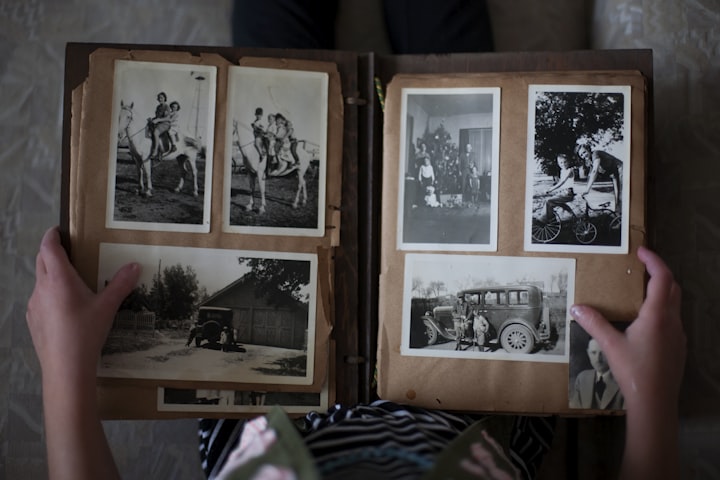The Way It Was
And Other Stories We Tell Ourselves

For as long as I can remember, it sat there, on the charming, oak, side table in my mother's bedroom. The corners were folded crisply, forming razor sharp points. Perhaps that was one of the ways she intended to keep its contents out of prying children's hands, but it hadn't always worked.
In fact, I did know one thing about that box covered in faded brown paper. It was quite heavy, or at least it seemed so to me, at about age six when I tried to lift it off the table. My mother, who had been brushing her hair in the dresser mirror, saw me only after I had slightly lifted it from its assigned position. She immediately spun around, launched herself across the bed and swiped it from my hands.
"Lizzie," she said sternly, "Do not ever touch that box!"
Had my mother been half as interested in psychology as I was at 30, she would have understood that telling a child to "not ever" do anything, was the equivalent of putting a giant sign above it saying: "Free candy for life, if you just open this box". I guess that's why I'm the psychologist in the family.
Truth be told, our family could have benefited quite a bit from psychological intervention much sooner in our lives. My parents have always refused to acknowledge any personal or parental missteps, never apologized for anything and thought most "issues" would just go away if you ignore them long enough.
I became fascinated by psychology in college, completely by accident, after taking Child Development as an elective class. I had come to the realization that there were many reasons that I struggled with certain personality "traits", in both myself and others. I was, and still am an insanely sensitive, overly anxious person, who is prone to severe depression.
So, I was thrilled to learn that my parent's style of parenting practically guaranteed that I would lack resilience, self-confidence, leadership skills, or the fortitude to stick with any task when presented with barriers to its success. Not that I wanted to continue all those traits indefinitely, but at the time it was nice to have at least some reasonable explanation as to why I had been prone to behave a certain way up to that point in my young life. After all, you can't change what you don't recognize.
I also deduced that my chronically impatient father had untreated depression, and my incessantly worrisome mother had incredibly serious anxiety issues. Putting those two genetic pools together, and adding an highly sensitive disposition is like lighting a fuse, and waiting for the explosion. Anyway, my fuse had been burning slowly for about 40 years when my mom called me up about six months ago, and said she had pancreatic cancer. She wasn't crying or outwardly frantic, which is how I know her anxiety was off the charts. She just stated it matter-of-factly, like she was ordering a cheeseburger at McDonald's.
As the oddball, "emotional wreck" of the family, I guess I should have come to expect this method of presentation, but for some reason I never got used to it. My father, who died four years ago, once had three members of his family die within six months of one another - his mother, his aunt and his younger sister. Each time, I'd get a mid-day phone call from my mom that went something like:
"So, <insert name here> died this <morning/afternoon/evening>. We probably won't be having a big service or anything, so don't worry about coming up for it."

I'd usually respond with, "Gee, that's too bad, well at least <he/she> isn't struggling anymore. Thanks for letting me know. Take it easy."
It wasn't until I got married that I realized this is not how you're supposed to deal with people in your family dying. Imagine my shock at my father-in-law's funeral, when I realized that this method wasn't particularly normal, nor healthy for anyone's mental state. In truth, functional families could genuinely express their emotions during difficult times, or even lean on one another for support. Boy, did that really put a damper on my entire childhood.
So, anyway, to get back to the story - my mother says "I have cancer", and my imbued anxious response kicks in. 'Have you done this? Have you tried that? Did you get a second opinion?' All of which elicit little to no response on the other end of the line. So I say,
"Ok, I'm coming home. I'll be there tomorrow."
Honestly, the entire flight I was completely overwhelmed. That's another mental state I had visited, but never left. I tapped my foot uncontrollably on the flight, and didn't hear anyone who said anything to me because I was remembering the last week of my father's life, particularly, our last 'conversation'.
"Hi Dad, I just want to say I love you and everything will be ok here. Rest easy."
He couldn't answer me, and I'm pretty sure that's the way he wanted it. By the time my mother had called my sisters and I, he had already slipped into unconsciousness, so it was just a matter of time. He would have never wanted us there when he was awake. He hadn't ever used the words "I love you" in our entire lives; no point in starting on your deathbed. Now, here we were at this point again. At least she hadn't waited until unconsciousness, and had someone else call. I guess that's progress.
The flight landed early, I got in my rental car and drove the hour from the airport to home. The first thing I always notice when I walk into my childhood home is the smell. It's changed slightly over time, but still reminds me of black pepper and linoleum.

"Mom?" I announced loudly enough for her to hear with her hearing aids.
"Up here." That was my eldest sister, Leslie, not my mother. She lived in the same town where we grew up, so it didn't surprise me she was there, but my middle sister, Lyla, had driven up from North Carolina already as well.
"How's she doing?" I asked, as I entered.
"She's in and out, the hospice nurse gave her some meds for the pain so she's pretty out of it right now. She's been sleeping since she called you yesterday."
"Hospice nurse? She just told me she had cancer yesterday!"
"Yea, she knew it would be hard for you to be here, so she wanted to wait."
'Hard for me or hard for her?' I thought to myself. My older sisters didn't handle my sentimentality any better than my parents did. I sat on the side of the bed with my mom, and took her hand. As I looked at her, I could feel myself getting distracted. It was right there, in my peripheral vision. The crisp corners, the twine bow, everything. It was still sitting there, looking as untouched as it did 40 years ago.
"Hey Leslie, has mom ever told you guys what is in that box, " I asked, pointing directly at it.
"I think it's something Grandma gave her, but I've never seen it. I just know she never wanted us to touch it when we were little," Leslie answered, "She caught Lyla on the floor about to open it one time, and I could hear the yell from downstairs."
"I was only four years old. How was I supposed to know?"
"Hmm," I replied. "You guys were at school when I got a lecture about it. So she's never opened it?"
"Never. It looks exactly like it always did, " Lyla sighed.
Just then, my mother started breathing heavily. Afraid I was blocking her air in some way, I stood up and set her hand down. The breathing became raspy and faster, but there seemed to be less and less movement in her chest. Finally, with one long, last exhale it was over.

"What just happened?" I asked frantically.
"That's it, she's gone," Leslie said through tears. Lyla buried her head in her hands and I sat there stunned for several minutes, unable to believe it.
Finally, Leslie took charge, "I'll call the coroner."
Later that night, after all the necessary visits had been made, plans had been set, and the room cleaned, I went back in, and sat down on a ruffled side chair. The sun was setting and the room was filled with an orange glow. We had opened the window to let some fresh air in, and a gentle summer breeze pushed lightly on the light blue, cotton curtains.
I stared and stared at that box for so long that I actually got angry at it. 'It was just another way of keeping our feelings in check all the time. Why couldn't we just open it?'
Eventually, I got up, walked slowly to the bedside table, and lifted the box. It was much lighter than I remembered as a child, but everything seems bigger when you are little. Whatever was inside shifted slightly as I moved it.
Sitting back down on the chair, I gently tugged the twine until it was untied. I dropped it on the floor and reached underneath. Tears streaming down my face, I picked at the yellowed tape until the sides opened and I was able to slide the box out.
It was an old shoebox with the word 'Dahlias' emblazoned in red along the side. It was brand of shoe that I'd never heard of, and likely no longer existed. There was tape on the sides of the box, so I scratched that off as well.
'My mother's wrapping jobs' I thought to myself. She always seemed to use an entire roll of scotch tape on just one package.
Finally, I was able to lift the cover.
Inside I found a mound of tissue paper with a yellowing envelope on top. I opened it and read the note:
"Dee Dee, (my mom's nickname)
Daddy would have wanted you to have these. He loved you very much, and I know he's looking down on you today.
Mama"
The note was from my grandmother to my mother. The date in the upper corner said August 2, 1969 - my parent's wedding day. Neither myself nor my sisters had ever met our grandfather. He had died in a late-night car accident six months before my mother's wedding. The newspaper clipping I found in an old album said he had been betting on horses at the track, and fell asleep at the wheel while driving home. As a result, he never walked her down the aisle.
I can't recall having ever heard my mother tell me any stories about her father beyond that one. Even as one of seven siblings, none of them had ever really spoke of him, and I'd only seen one actual photograph in my whole life. To the outsider, the most obvious manifestation of this trauma in my mother, was that she abhorred any form of gambling ever since that time.
I moved the pink tissue paper aside and found a photo album. I flipped it open, and began looking through literally hundreds of photos of my grandfather. In most of them he was playing with my mother and her siblings as babies or young children. I'm sure she had little to no recollection of many of these moments because of her age, but sadly, she had never opened the box to see them. Now she never would.
I sat there flipping the pages and crying uncontrollably for at least a half hour, then I carefully placed the album back in its box and carried it downstairs to my sisters.
About the Creator
Sydney Chapman
Starting over, yet again.






Comments
There are no comments for this story
Be the first to respond and start the conversation.